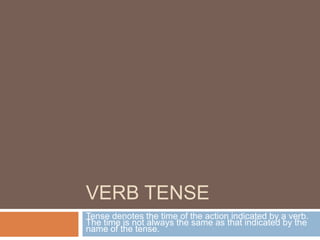
Verbtense 120206145933-phpapp01
- 1. VERB TENSE Tense denotes the time of the action indicated by a verb. The time is not always the same as that indicated by the name of the tense.
- 2. 6 Types of Verb Tenses Verb Tenses Present Past Future Future Perfect Past Perfect Present Perfect
- 3. Present Tense Present tense may express action which is going on at the present time or which occurs always, repeatedly, or habitually. Examples: He sees the train. He eats cereal for breakfast every day. Your Turn: Write a present tense sentence about your morning routine.
- 4. Past Tense Past tense expresses action completed at a definite time in the past. Examples: He wrote the letter yesterday. She lived to be 90 years old. Your turn: Write a past tense sentence about Superbowl Sunday.
- 5. Future Tense Future tense expresses action which will take place in the future. It uses the helping verbs will or shall* and the present tense form of the verb). Examples: He will send the letter tomorrow. I shall wait here until you return. • Traditionally, shall is used for 1st person and will for 2nd and 3rd persons. I shall be late. We will be late.
- 6. Your Turn Write two future tense sentences about your plans for Spring Break. *Try to use shall (personal) and will (plural)
- 7. Present Perfect Tense Present perfect tense expresses action completed at the present time (perfect means complete) or begun in the past and continuing into the present. This tense uses the helping verbs has and have and the past participle of the verb. Examples: He has written a letter to his uncle. (completed action) The Waltons have lived here for seven years. (started in past, BUT still continuing)
- 8. Your turn Write three (3) present perfect sentences selecting from any of the following irregular verb forms. Forbidden Set Fallen Brought Swum Taken Sprung Meant
- 9. Past Perfect Tense Past perfect tense expresses action completed before certain time in the past. (This is the before-past tense.) It uses the helping verb had and the past participle of the verb. Example: Sheryl had sent the email before her manager returned from the meeting.
- 10. Your turn Write a past perfect tense sentence about something you are skilled at doing (i.e. you could do it blind-folded and asleep without messing up).
- 11. Future Perfect Tense Future perfect tense expresses action which will be completed before a certain time in the future. (This is the before-future tense) It uses the helping verbs will have or shall have and the past participle of the verb. Example: He will have finished the paper before next Friday. Your turn: Write a future perfect tense sentence about an upcoming class assignment (any course).
- 12. Verb Forms Verb Forms Regular Irregular
- 13. Regular Verbs Regular verbs form their past tense and past participle by adding –ed or –d to their present tense form. More than 95% of all English verbs are regular. Regular verbs cause few problems in speaking and writing.
- 14. Regular verbs and their Principal Parts Principal Parts: Verb: Present Tense Present Participle Past Tense Past Participle To call call, calls calling called (have) called To dust dust, dusts dusting dusted (have) dusted
- 15. Irregular Verbs Irregular verbs can form their past tense and past participle forms in various way. These forms cause even native speakers innumerable problems. The most irregular verb of all is the verb to be. Another irregular verb that is important for its use with other verbs is the verb to have.
- 16. Four Principal/Main Parts Principal Parts: Verb: Present Tense Present Participle Past Tense Past Participle To Be be, am, are, is being was, were (have) been To Have have, has having had (have) had
- 17. Other Common Irregular Verbs and their Principal Parts Principal Part Verb Present Tense Present Participle Past Tense Past Participle To see see, sees seeing saw (have) seen To do do, does doing did (have) done To fly fly, flies flying flew (have) flown To run run, runs running ran (have) run
- 18. Conjugation A conjugation of a verb is the correct arrangement of its form through its tenses, persons, and numbers. Person means the speaker, the person spoken to, and the person or thing spoken of. Number means singular or plural.
- 19. Conjugation of the verb: to be Tense Singular Plural Present I am You are He, she, it is We are You are They are Past I was You were He was We were You were They were Future I shall be You will be He will be We shall be You will be They will be Present Perfect I have been You have been He has been We have been You have been They have been Past Perfect I had been You had been He had been We had been You had been They had been Future Perfect I shall have been You will have been He will have been We shall have been You will have been They will have
- 20. Your Turn: conjugate each verb Tense Singular Plural Present 1) Saunter 2) Facilitate 3) Deal* 4) Discriminate 5) Drink * Past Future Present Perfect Past Perfect Future Perfect
- 21. Answers Ve rbs 1) Saunter 2) Facilitate 3) Deal* 4) Discriminate 5) Drink * Singular Plural Past Future Present Perfect Past Perfect Future Perfect
